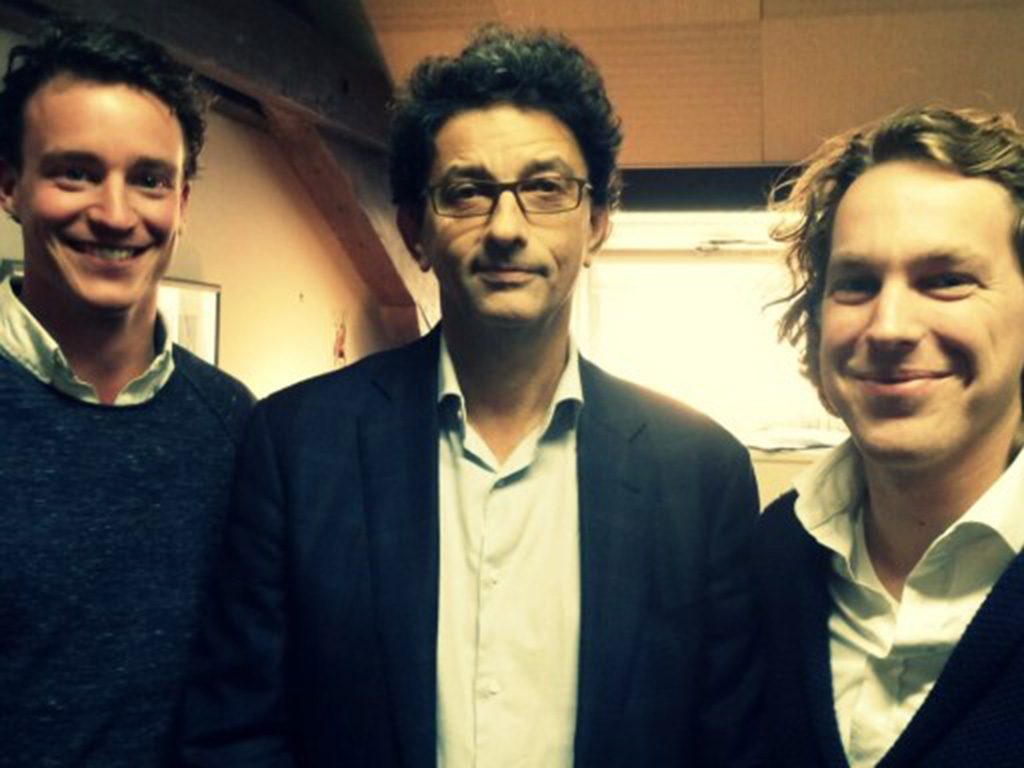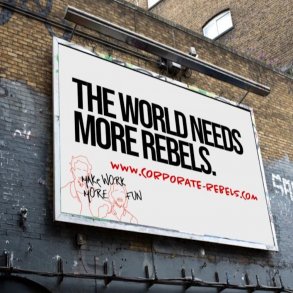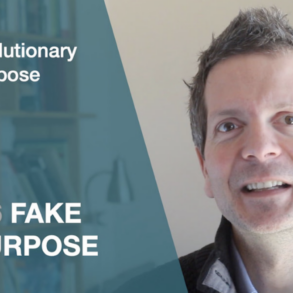This week we had the pleasure and privilege to meet up with two of the biggest heroes of our bucket list: Frederic Laloux (author of Reinventing Organizations) and Isaac Getz (author of Freedom, Inc.). We cannot deny that the thought of meeting these two world-changers within 24 hours was very exciting and slightly nerve-racking. Comparing both meetings seems simply impossible since they turned out to be completely different and both unique in its own kind. Let’s share a bit of the huge amounts of inspiration and lessons we received from both of them.
The Bucket List Heroes
Frederic Laloux
At first we traveled to Brussels to share a dinner with Frederic Laloux and his wife Hélène at their cozy house in the center of the Belgium capital. Frederic has written a must-read book on the evolution of organizations. In his brilliant book Reinventing Organizations he proved with a plenitude of practical examples that new ways of organizing can be very successful. Frederic describes the evolution of so-called ‘Teal’ organizations that differentiate themselves on evolutionary purpose, self-management and wholeness. We shared our visions and thoughts over a home-made pasta carbonara and a glass of fine Côtes du Rhône. The very personal setting in which we enjoyed the dinner created an extraordinary ambiance of trust and inspiration. It was enjoyable to discuss the topic and our common purpose in such a pleasant setting.
Isaac Getz
Next morning we traveled from Brussels to Paris to meet up with Isaac Getz. Isaac is professor of Leadership and Innovation Management at ESCP Europe and one of the writers of the book Freedom, Inc. In his groundbreaking and pioneering book he claims that the key to a successful business is providing employees with enough breathing room. He uses a range of examples of ‘liberated companies’ that illustrate that the more freedom employees enjoy, the more benefits the company will reap. We met for a long afternoon with Isaac in his office at the Parisian Business School ESCP Europe. However, we were not alone. Soon after our arrival we were joined by cameraman Martin and journalist Elisa of France2 national television. They too were highly interested in the liberation movement that Isaac has launched within the French corporate world. Under the watching eye of the camera, we discussed the subject that has the potential to change the world and the ecosystem that Isaac has built up since the release of his book.
4 lessons learned
Frederic and Isaac have an impressive amount of knowledge and expertise on reinventing and liberating organizations. Some years ago they have made a journey that is very similar to the journey we are currently on. Due to his strong consulting background Frederic has intensely studied the practices and processes associated with ‘Teal organizations’. Several years before, Isaac studied and described the leaders of such liberated organizations from a more psychological point of view. We have derived various useful lessons from their work and we want to share four of them that stood out.
1. Leaders: remove all symbols of inequality!
One of the easiest and most powerful ways to start liberating a company is to get rid of all priviliges and symbols that enforce inequality. The reserved parking spots, separate restaurants, and overly expensive top floors (with wooden floors, expensive art, and great views) don’t compare to the boring cubicles of the employees at the bottom of the pyrimad. The difference in priviliges creates a huge gap between the leaders and the employees. Leaders get separated from employees that do the actual work, which in turn leads to leaders getting separated from reality.
This is why Isaac Getz advises to start with creating intrinsic equality for everyone within the company. Get rid of status symbols and priviliges in a step by step approach. There should not be any imbalance in empowerment or special privileges for the leaders or bosses. Everyone in the organization should be treated with similar rights and privileges. It will lead to more trust, initiative and engagement within the organization.
Once you’re in charge, remove everything you didn’t like as a subordinate and implement what you missed. – Robert Townsend
2. CEO not involved? Forget liberation..
Both Isaac as Frederic stress the need for a strong and inspiring leader to foster a successful liberation of any organization. Frederic states that ‘the values of the organizations can only be as developed as the values of the leader’. This means that the organization can only evolve further if the leader really desires making next liberation steps within the organization. Those liberation believes should derive from the intrinsic motivation of the leader or should be evoked by intensive coaching sessions. Examples of such strong evolving leadership can be found in pioneers like Ricardo Semler (Semco), Bill Gore (W.L. Gore), Jean-Francois Zobrist (FAVI), Yvon Chouinard (Patagonia) and the recently visited Sjoerd van der Velden (BvdV) and Mark Vletter (Voys).
3. Consultants, don’t get your hopes up. There is no golden formula for success!
Successful liberation of traditional companies is achieved through different ways. In fact, as many ways as there are companies. It needs to be stressed that there is not just a simple roadmap that leads to this liberation. Time and time again, this is proven by companies that have unsuccessfully tried to copy-paste the formula of another company. Think about it, if a simple step-by-step action plan would exist, nobody of us would work in hierarchical and unmotivated workplaces right now. And unfortunately, too many of us do. Therefore, it is interesting to observe the difference in how both heroes are designing their own liberation campaigns.
Isaac, for example, is actively involved in moving the “liberation movement” forward. After his book Freedom, Inc. he started giving talks, tv and radio interviews to create awareness on his mission. Once the word started to spread more and more CEOs became interested in liberating their own companies. Therefore, Isaac started to build a liberation ecosystem. This ecosystem consist of a community of companies that want to initiate their very own liberation campaign. Isaac gathers once a month with a group of CEOs to reflect and coach on their specific struggles and successes. He wants the CEOs to learn from each other and to inspire them to discover their own unique intrinsic motivators. In this way, Isaac hopes to develop the values of the leadership in order to change the values of the company in a top-down fashion. This approach seems to be highly successful, as shown by the popularity of the liberation movement in France.
Frederic believes and acts in a completely different way. He believes in building an ecosystem that is strongly supported by the leadership but wants the liberation movement to be driven by the community itself. He rather avoids media attention to provide room for anyone that wants to step up in his place. Therefore Frederic created a “Reinventing Organizations movement” that is open to anyone that is interested in contributing to his liberation mission. He believes strongly in the power of self-management and tries to execute his mission in this bottom-up approach. The popularity he gained by the release of his book, seems to have created sufficient momentum for the movement to move forward.




